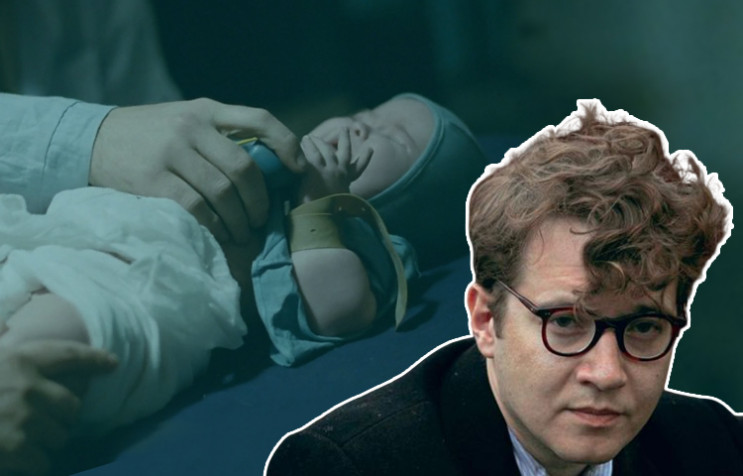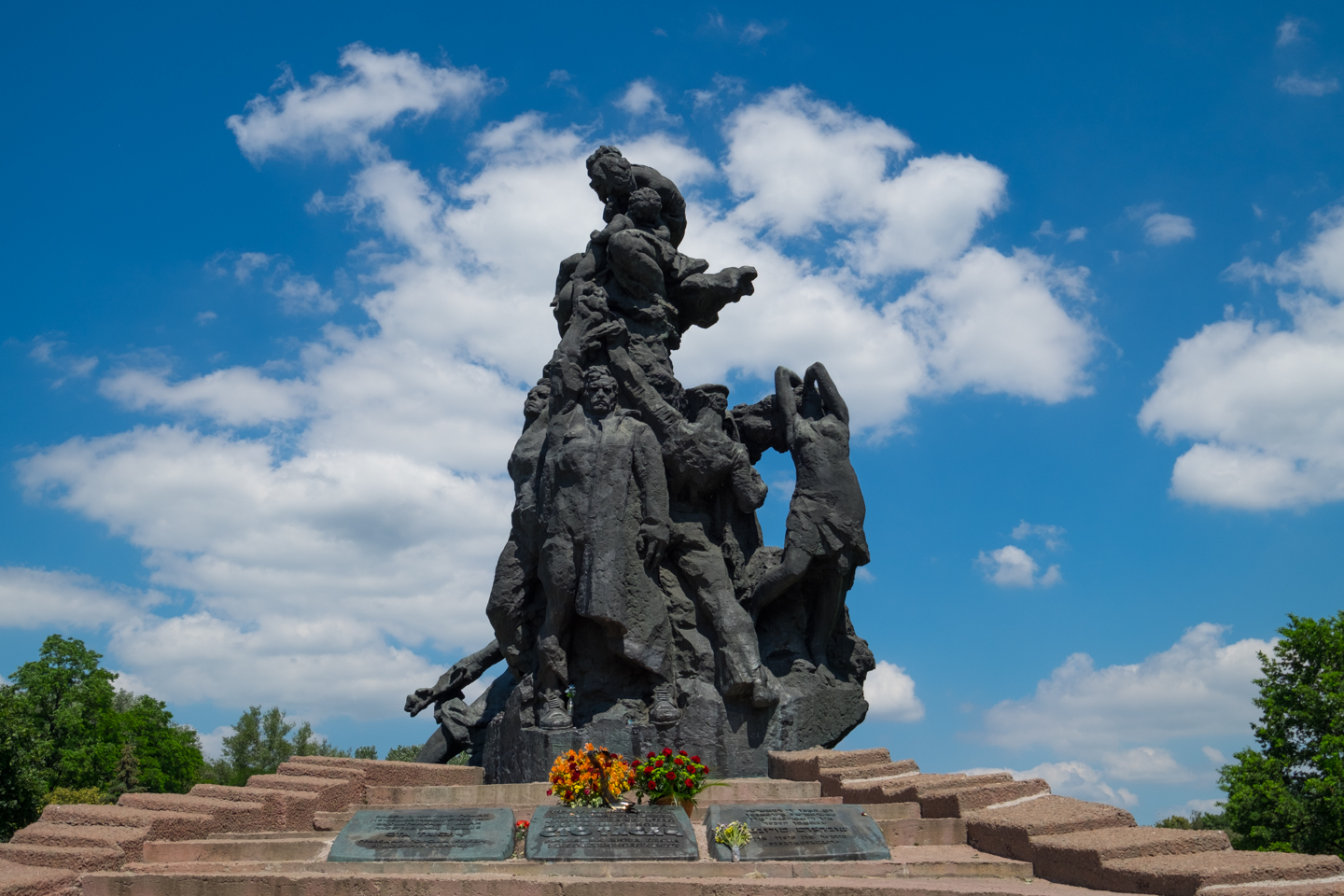Here is how it came to be that a Russian filmmaker has desecrated one of the country’s most important historical memory sites and how the state allowed such a situation to unfold.
The museum is planned to be built in Babyn Yar, where the largest executions were committed by Nazi Germany in Ukraine. Around 100,000 people were executed, including around 70,000 Jews, according to historian Vitaliy Nahmanovych.
Project manager, chief historian and other members left the team after Khrzhanovskyi was appointed as the new artistic director of the planned Holocaust Memorial in Kyiv
Illia Khrzhanovskyi is a Russian-born film director. The shooting of his last film, Dau Degeneration, lasted for 11 years and was finished in 2019. The small artificial town from the Soviet era was created near Kharkiv, Ukraine. People were living there for several years to make sure the film felt realistic and to induce various moments of spontaneousness. Khrzhanovskyi was accused of exploiting his actors — notably young orphans — through exposure to physical violence, humiliation, and sexual harassment during the shooting of the film. The police have already opened an investigation into the accusations against Khrzhanovskyi.
Khrzhanovskyi’s new vision of the Holocaust Memorial in Kyiv resulted in an Open Letter to the Board Members of the Babyn Yar Holocaust Memorial Center. The authors that penned the letter are prominent intellectuals and historians from around the world, including Ukraine. They view Khrzhanovskyi’s idea of immersing the visitor of Holocaust Memorial in a virtual reality (VR) reconstructed experience of violence and death, and forcing them on a journey of self-discovery through a series of choices as inappropriate.
On 23 April 2020, Dr. Karel Berkhoff, who since February 2017 served as the chief historian at the Memorial announced that, due to ethical concerns, his further support for the Babyn Yar Holocaust Memorial Center would be impossible. On 27 April 2020, the former head of the Core Exposition Development Group, Mr. Dieter Bogner sharply criticized the design concept presented by Mr. Khrzhanovsky. As a result, all of the key figures of the team abandoned the project after Khrzhanovskyi was appointed the artist director of the Holocaust Memorial.

The project promotes the Russian and Soviet narrative of history
Apart from a small memorial museum in honor of Babyn Yar victims, there are two competing projects of the museum that should encompass a large part of the territory of the Babyn Yar National Historical Memorial Reserve.
The first project of a memorial park was developed by Babyn Yar Public Committee (Vitaliy Nakhmanovych as Executive Secretary) together with leading Jewish NGO in Ukraine Ukrainian Jewish Encounter. This is a landscape and architectural project that proposes to commemorate not only Jews, but also Ukrainian nationalists, Soviet POWs, and the Roma prisoners of the Syrets concentration camp who were killed in the Babyn Yar as well.
The second project of Babyn Yar Memorial and Holocaust Museum is sponsored mainly by Russian businessmen of Jewish origin who were born in Ukraine – Mikhail Fridman, German Khan, and Pavel Fuks. However, the project was also later supported by several famous Ukrainians, including pop singer Sviatoslav Vakarchuk and Ukrainian oligarch Viktor Pinchuk. Some of them became members of a supervisory board that oversaw the project. The problem of this project was that it proposed to build a memorial center at the place of the massacre itself, contrary to Jewish religious leaders who said it would be a violation of religious prohibitions. The other problem is that it associates Babyn Yar only with Jewish victims, neglecting the fact that many Ukrainians were killed in the Babyn Yar, promoting the favorable view for Russia’s historical narrative. Josef Zissels, one of the initiators of the first project of a memorial park proposed to unify efforts and create a comprehensive memorial, but the efforts were in vain.
- Read more: Russian oligarchs push Babi Yar Holocaust Memorial project which discredits Ukraine – Zissels
The second project of Babyn Yar Memorial and Holocaust Museum appointed Khrzhanovskyi as the artist director, raising a new wave of criticism to the controversial project.
What the Ukrainian state doing about the project
In his New Year speech, Zelenskyy described his vision for Ukraine as “where it makes no difference, at which monument you’re waiting for the girl you love.” Indeed, the state lacks any sort of national memory towards the Babyn Yar Memorial and how it should look like. The current Shmygal’s government has thus far failed to find a new Minister of Culture. However, even before Zelenskyy took office, things weren’t going much better.
The controversy surrounding the Babyn Yar Holocaust Memorial initally began in 2009. The city of Kyiv leased a part of the Babyn Yar land to Vadym Rabinovich, who later became a pro-Russian politician. Today he is one of the leaders of the Oppositional Platform, Ukraine’s inner fifth column (a group working from within to destroy) that openly advocates for the integration with Russia and is co-managed by Putin’s crony Victor Medvedchuk. A portion of the Babyn Yar land was leased to Rabinovich despite the fact that this land included a historical Jewish cemetery.

However, six years later, politicians still did not bother to be more cognizant of the national historical memory, even as Ukraine was fighting an undeclared war with Russia. In 2015, the agreement regarding the lease of the part of Babyn Yar land was prolonged by the mayor of Kyiv.
A year later, Rabinovych sold his rights for the land for US$ 2.7 million to the Russian businessmen, Pavlo Fuchs. A new organization named Babyn Yar Holocaust Memorial Center was created with three Russian businessmen as the founders — Fuchs, Fridman, and Khan.
Although a part of the land is leased, the territory is a National Historical Reserve — any construction requires special permission. Therefore, building a memorial suitable for the state and Ukrainian civil society in principle wouldn’t be too difficult even in the face of significant Russian influence. The only issue is that such a move requires political will; including further confrontation with Russia — something that Zelenskyy doesn’t have an appetite for.
There should be no private projects in Babyn Yar, – Vitaliy Nakhmanovych, Historian and Executive Secretary of the Babyn Yar Committee says. – And in general, the issue is not only regarding Babyn Yar. This is just one of the symptoms of the state of historical memory in Ukraine. Since 1991, Ukraine has had neither a consistent policy, nor also a common vision of its own memory. Every new government, every president builds it in its own way… The problem with historical memory is not just building a monument. It doesn’t matter if there is a monument or not when people don’t visit it.
Nakhmanovych emphasizes that if the Ukrainian national memory is not actively supported by the state then projects sponsored by foreign entities and individuals including Ukraine’s enemies, will fill the memory vacuum:
Historical memory is what unites a community; it shows the longevity of its existence. Ukraine’s problem is that Ukraine tolerates attempts to throw at us a “correct” vision of historical memory literally from all sides. Russians, Poles, Israelis, Americans, Germans – anyone. Everyone knows how Ukraine should remember its history. Why? Because the prospects of our relations with certain countries will largely depend on what our policy of historical memory will be.
Another prominent Ukrainian historian Serhiy Plokhy said during the international discussion on 8 May 2020 that “Ukraine is now a major battleground in terms of narratives and different forms of understanding of what was going on in World War II.” If a common narrative about the Second World War is going to be formulated in Ukraine, it will be an important step to reach an agreement on the European stage and the world stage, according to Plokhy.
In order to reach a consensus, there must be a critical examination of the roles that controversial figures and organizations played during World War II. They should be considered and discussed critically, honestly and with the right context, instead of labeling everyone only as a hero or collaborator in a Soviet manner. The public shouldn’t accept a one-sided narrative of who was the victor during World War II that is now promoted by Putin.
The battle over the Babyn Yar Holocaust museum is in essence, a battle to control the narrative over World War II. This battle is not unique to Babyn Yar as Russia is disputing many different narratives surrounding WWII, including the Soviet Union’s alliance with Nazi Germany. Russian propaganda attempts to portray the WWII struggle of “great Soviet victors” rather than taking a holistic approach to history that includes soviet crimes and soviet occupation as well as struggle of conquered nations for independence by guerrilla methods. At present, neither narrative has enough support from the wider public in Ukraine to begin the construction of a real Holocaust memorial in Kyiv.
Read more:
- Ukrainians gradually move away from Soviet stereotypes regarding World War II – poll
- Jewish survivors of Babi Yar Holocaust massacre recall events, reconstruct exact shooting location
- Top-6 Soviet World War II myths used by Russia today
- Understanding the Ukrainians in WWII Part 3. Of German plans and German collaborators
- Munich and the Molotov-Ribbentrop pact revisited, Part 3: The way to European catastrophe
- In the shadow of revised history: Kremlin’s war on remembrance continues
- The struggle for Carpatho-Ukraine (1938-1939), or how WWII started for Ukrainians
- Ravensbruck concentration camp hospital – factory of death








